2022年中考英语(人教版)一轮复习七年级下册Units 1-4课件(96张PPT)
文档属性
| 名称 | 2022年中考英语(人教版)一轮复习七年级下册Units 1-4课件(96张PPT) |  | |
| 格式 | pptx | ||
| 文件大小 | 2.3MB | ||
| 资源类型 | 试卷 | ||
| 版本资源 | 人教新目标(Go for it)版 | ||
| 科目 | 英语 | ||
| 更新时间 | 2022-01-17 11:55:08 | ||
图片预览


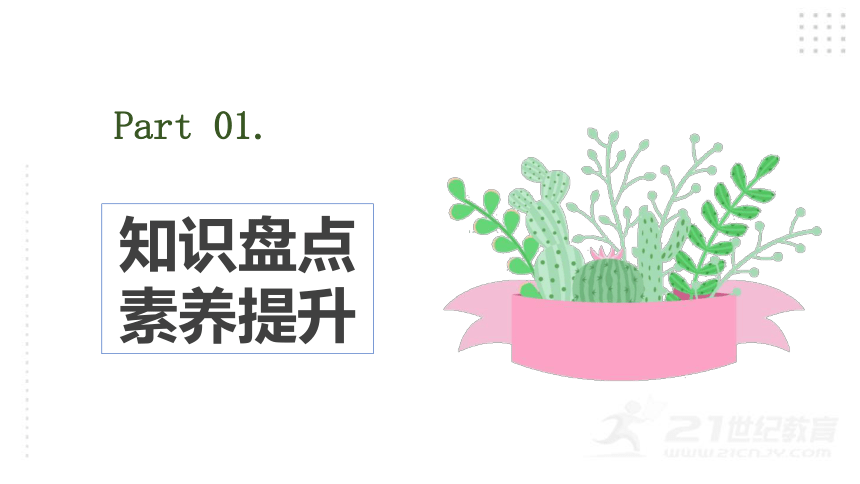
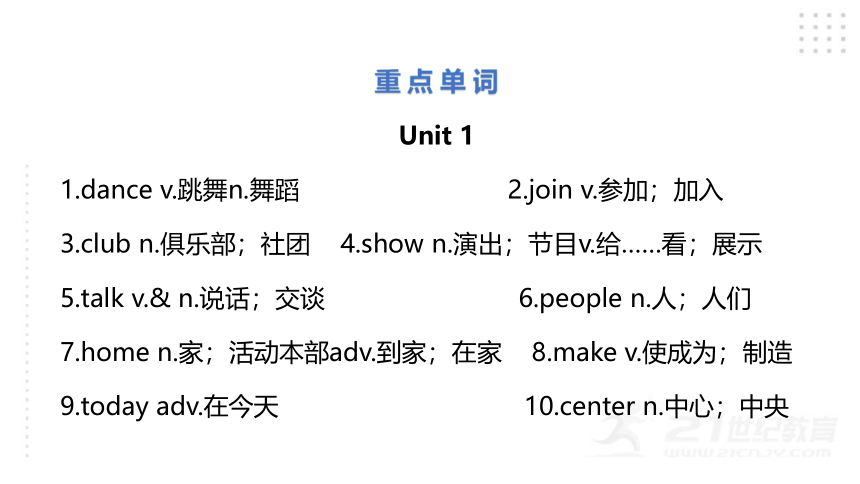
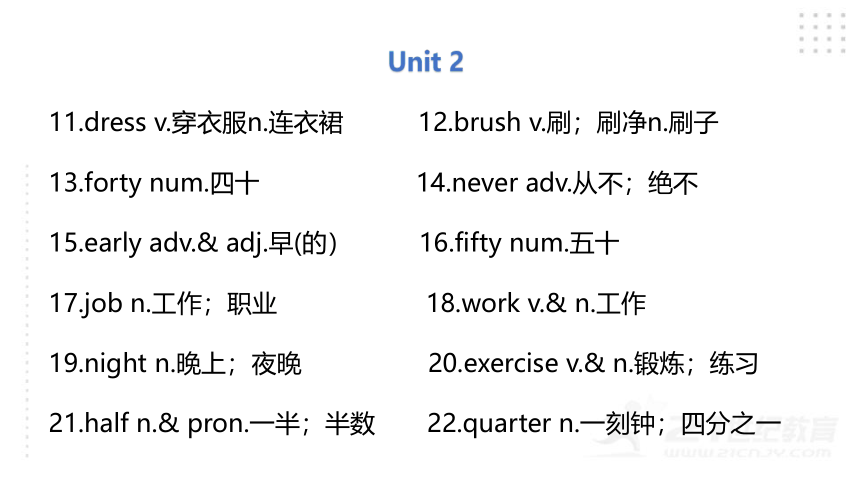
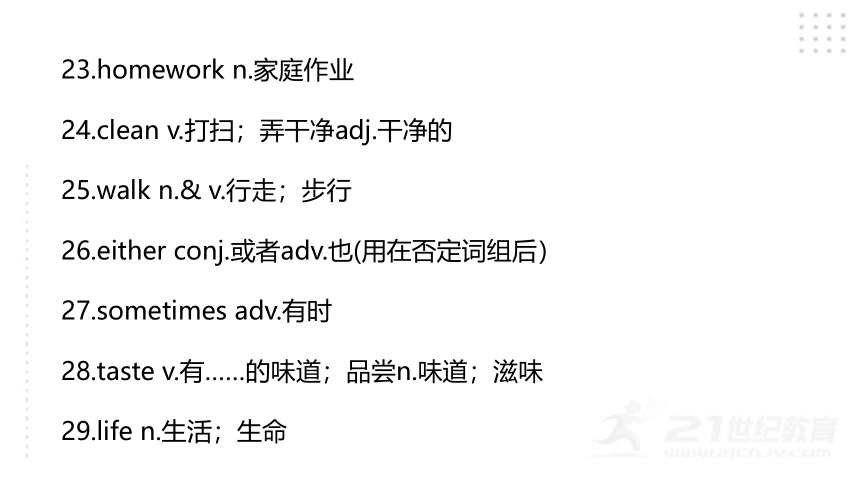
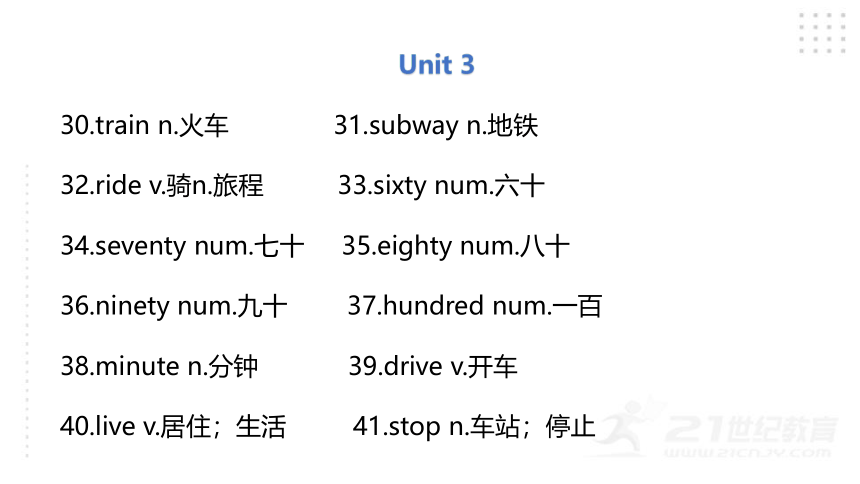
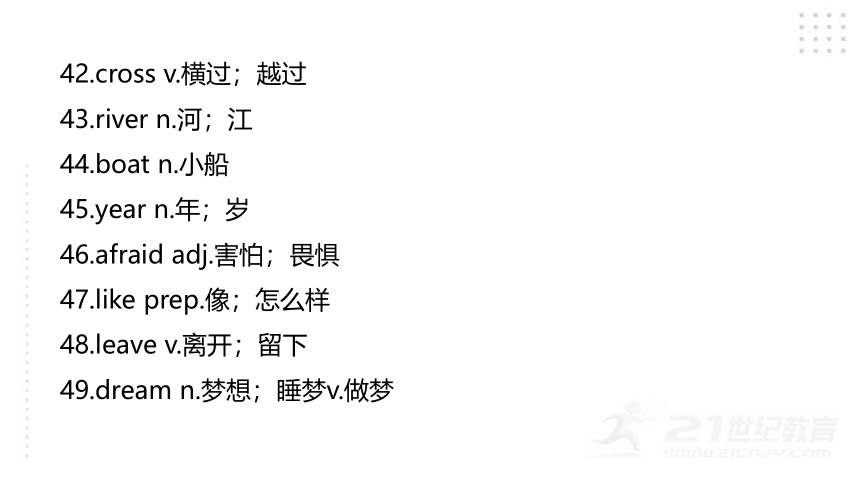
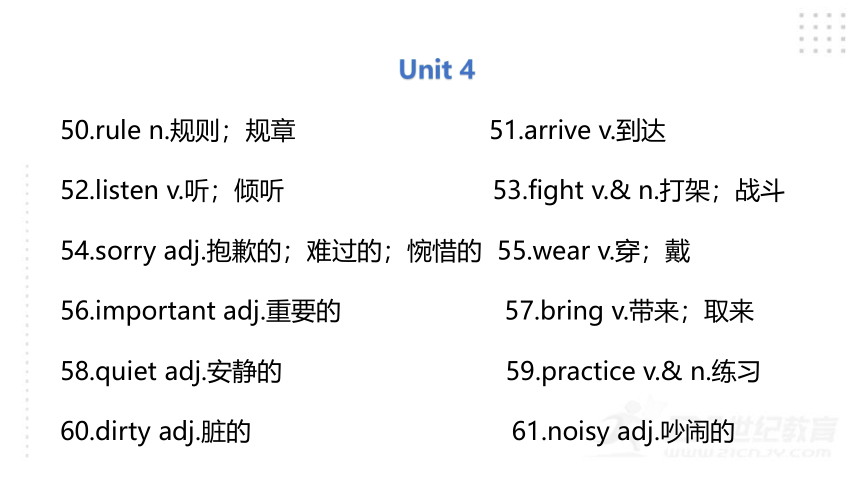
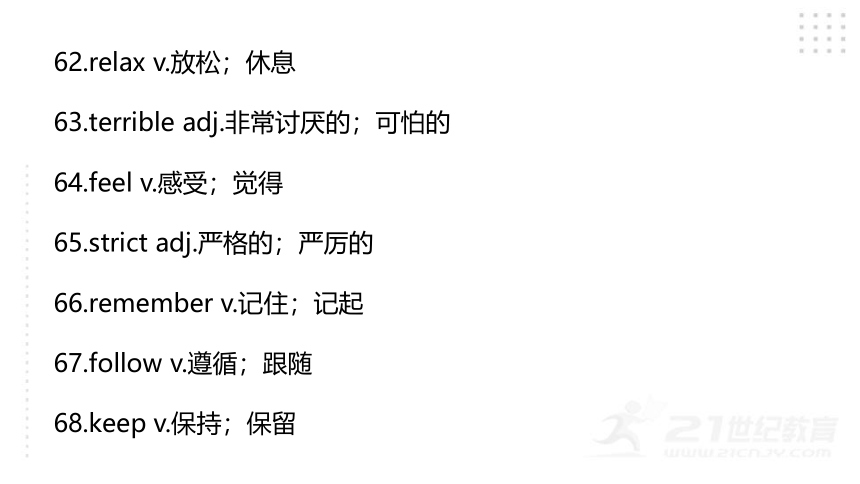
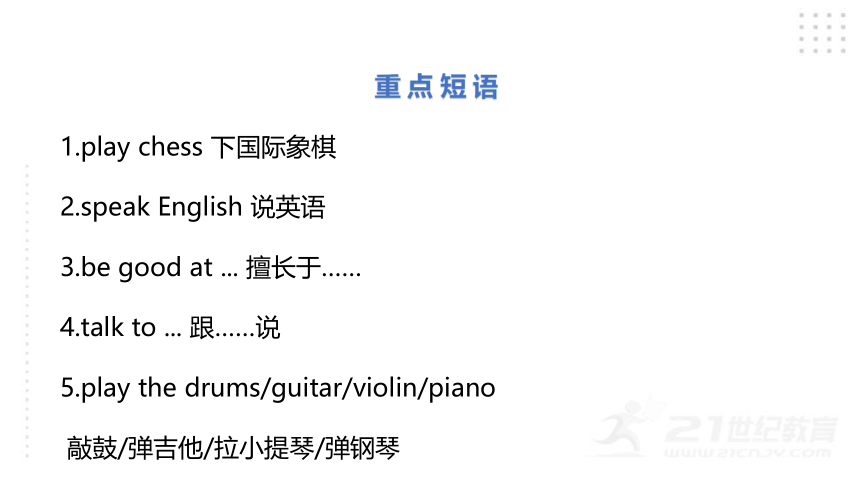
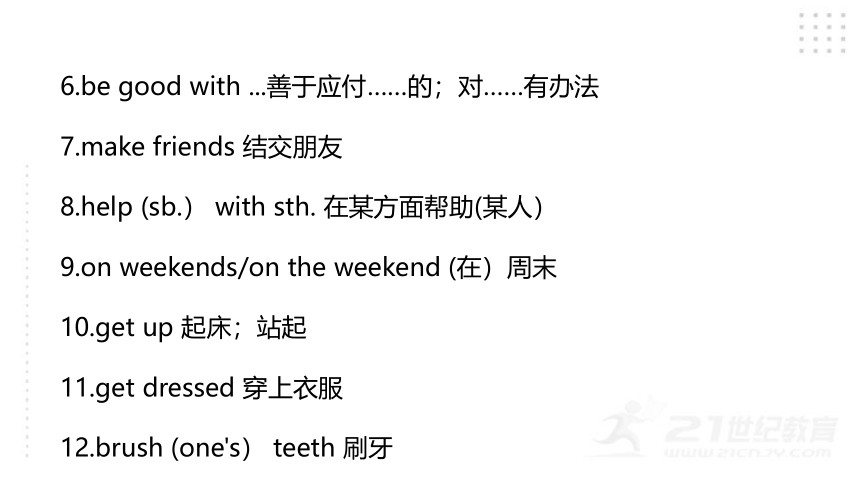
文档简介
(共96张PPT)
2
0
2
2
2022年中考英语一轮复习
课本梳理
人教(新目标)版
七年级下册
Units 1—4
知识盘点 素养提升
考点梳理 拓展素养
目录
content
01.
02.
Part 01.
知识盘点 素养提升
重 点 单 词
Unit 1
1.dance v.跳舞n.舞蹈 2.join v.参加;加入
3.club n.俱乐部;社团 4.show n.演出;节目v.给……看;展示
5.talk v.& n.说话;交谈 6.people n.人;人们
7.home n.家;活动本部adv.到家;在家 8.make v.使成为;制造9.today adv.在今天 10.center n.中心;中央
Unit 2
11.dress v.穿衣服n.连衣裙 12.brush v.刷;刷净n.刷子
13.forty num.四十 14.never adv.从不;绝不
15.early adv.& adj.早(的) 16.fifty num.五十
17.job n.工作;职业 18.work v.& n.工作
19.night n.晚上;夜晚 20.exercise v.& n.锻炼;练习
21.half n.& pron.一半;半数 22.quarter n.一刻钟;四分之一
23.homework n.家庭作业
24.clean v.打扫;弄干净adj.干净的
25.walk n.& v.行走;步行
26.either conj.或者adv.也(用在否定词组后)
27.sometimes adv.有时
28.taste v.有……的味道;品尝n.味道;滋味
29.life n.生活;生命
Unit 3
30.train n.火车 31.subway n.地铁
32.ride v.骑n.旅程 33.sixty num.六十
34.seventy num.七十 35.eighty num.八十
36.ninety num.九十 37.hundred num.一百
38.minute n.分钟 39.drive v.开车
40.live v.居住;生活 41.stop n.车站;停止
42.cross v.横过;越过
43.river n.河;江
44.boat n.小船
45.year n.年;岁
46.afraid adj.害怕;畏惧
47.like prep.像;怎么样
48.leave v.离开;留下
49.dream n.梦想;睡梦v.做梦
Unit 4
50.rule n.规则;规章 51.arrive v.到达
52.listen v.听;倾听 53.fight v.& n.打架;战斗
54.sorry adj.抱歉的;难过的;惋惜的 55.wear v.穿;戴56.important adj.重要的 57.bring v.带来;取来
58.quiet adj.安静的 59.practice v.& n.练习
60.dirty adj.脏的 61.noisy adj.吵闹的
62.relax v.放松;休息
63.terrible adj.非常讨厌的;可怕的
64.feel v.感受;觉得
65.strict adj.严格的;严厉的
66.remember v.记住;记起
67.follow v.遵循;跟随
68.keep v.保持;保留
重 点 短 语
1.play chess 下国际象棋
2.speak English 说英语
3.be good at ... 擅长于……
4.talk to ... 跟……说
5.play the drums/guitar/violin/piano
敲鼓/弹吉他/拉小提琴/弹钢琴
6.be good with ...善于应付……的;对……有办法
7.make friends 结交朋友
8.help (sb.) with sth. 在某方面帮助(某人)
9.on weekends/on the weekend (在)周末
10.get up 起床;站起
11.get dressed 穿上衣服
12.brush (one's) teeth 刷牙
13.take a shower 洗淋浴
14.do (one's) homework 做作业
15.take a walk 散步;走一走
16.either ...or ... 要么……要么……;或者……或者……
17.lots of 大量;许多
18.get to 到达
19.take the subway 乘地铁
20.ride a bike/by bike 骑自行车
21.every day 每天
22.think of 认为;想起
23.between ...and ... 在……和……之间
e true 实现;成为现实
25.arrive/be late for class 上课迟到
26.(be) on time 准时
27.listen to ... 听……
28.have to 必须;不得不
29.go out 外出(娱乐)
30.do the dishes 清洗餐具
31.make one's bed 铺床
32.be strict (with sb.)(对某人)要求严格
33.follow the rules 遵守规则
词 汇 拓 展
1.sing v.→ sang (过去式)唱歌
→ sung (过去分词)
→ singer n.歌手
2.swim v.→ swam (过去式)游泳
→ swum (过去分词)
→ swimming (现在分词)
→ swimmer n.游泳者
3.dance v.→ dancer n.舞者
4.speak v.→ spoke (过去式)说(某种语言);说话
→ spoken (过去分词)
→ speaker n.讲(某种语言)的人;发言者
5.tell v.→ told (过去式/过去分词)讲述;告诉
6.story n.→ stories pl.故事;小说
7.write v.→ wrote (过去式)写作;写字
→ written (过去分词)
→ writer n.作者;作家
8.teach v.→ teaches (第三人称单数形式)教;讲授
→ taught (过去式/过去分词)
9.music n.→ musician n.音乐家
→ musical adj.音乐的
10.tooth n.→ teeth pl.牙齿
11.usual adj.→ usually adv.通常地;一般地
→ unusual adj.特别的;不寻常的
12.fun n.→ funny adj.奇怪的;滑稽好笑的
13.good/well adj./adv.→ better (比较级)更好的(地)
→ best (最高级)最好的(地)
14.run v.→ ran (过去式)跑;奔
→ run (过去分词)
→ running (现在分词)
15.quick adj.→ quickly adv.很快地
16.life n.→ lives pl.生活;生命
17.village n.→ villager n.村民
18.leave v.→ left (过去式/过去分词)离开;留下
19.fight v.→ fought (过去式/过去分词)打架;战斗
20.bring v.→ brought (过去式/过去分词)带来;取来
21.noisy adj.→ noise n.声音;噪音
22.terrible adj.→ terribly adv.非常(地);很
23.feel v.→ felt (过去式/过去分词)感受;觉得
→ feeling n.感觉;感触;感情
24.luck n.→ lucky adj.幸运的
→ unlucky (反义词)不幸的
→ luckily adv.幸运地
→ unluckily (反义词)不幸地
25.keep v. → kept (过去式/过去分词)保持;保留
26.learn v.→ learnt/learned (过去式/过去分词)学习;学会
→ learner n.学习者
重 点 句 型
1.Then we need you to help with sports for English-speaking students.
那么我们需要你帮助说英语的学生开展体育活动。
2.In the evening,I either watch TV or play computer games.
晚上我要么看电视要么玩电脑游戏。
3.She knows it's not good for her,but it tastes good !
她知道这对她(健康)不利,但它(指冰激凌)尝起来味道很好!
4. For many students,it is easy to get to school.
对于很多学生来说,到学校很容易。
5. It is their dream to have a bridge.
拥有一座桥是他们的梦想。
6. Don't arrive/be late for class.
上课不要迟到。
7. Don't leave the dirty dishes in the kitchen!
别把脏碗留在厨房里!
8.After dinner,I can't relax either .
晚饭后我也不能放松。
情 景 交 际
谈论能力、特长
1.—Can you swim 你会游泳吗?
—Yes,I can./No,I can't.是的,我会。/不,我不会。
2.—What can you do 你会做什么?
—I can dance.我会跳舞。
3.—What club do you want to join 你想参加什么俱乐部?
—I want to join the art club.我想参加美术俱乐部。
询问和表达时间
4.—What time do you usually get up 你通常几点起床?
—I usually get up at six thirty.我通常在六点三十分起床。
5.—When does Scott go to work 斯科特什么时候去上班?
—He always goes to work at eleven o'clock.他总是十一点钟去上班。
谈论出行方式
6.—How do you get to school 你怎样去学校?
—I ride my bike/take the bus./By subway./On foot.
我骑自行车/乘公共汽车。/坐地铁。/步行。
7.—How long does it take you to get to school 你到学校要用多少时间?
—About 15 minutes by bike.骑自行车大约15分钟。8.—How far is it from your home to school 从你家到学校有多远?
—It's only about two kilometers.只有两千米左右。
谈论规则
9.—Can we eat in the classroom 我们能在教室里吃东西吗?
—No,we can't,but we can eat in the dining hall.不,我们不能,但是我们能在餐厅吃东西。
10.—Does he have to wear a uniform at school 他在学校必须穿校服吗?
—Yes,he does./No,he doesn't.是的,必须。/不,不必。
11.—What do you have to do 你们必须做什么?
—We have to be quiet in the library.我们必须在图书馆里保持安静。
语 法
1.特殊疑问句(what,what time,when,how,how long,how far)
2.频度副词 3.祈使句 4.情态动词
Part 02.
考点梳理
素养提升
I want to join the art club.
我想参加美术俱乐部。(Unit 1 P1)
【辨析】join,join in,take part in与attend这四个词(短语)都有“参加”的意思,具体区别如下:
考点1
[join the Party]
[attend school]
( C )1.—Would you like to the music club to learn singing
—Yes,I'd love to.
A.attend B.take C.join D.show
( C )2.Not only the students but also the teachers took part the school sports meeting last week.
A.at B.on C.in D.for
学
以
致
用
3.Everyone likes to attend Mr Smith's classes.They are always interesting and lively.
4.The Tokyo 2020 Olympics were held from July 23 to August 8.Chinese athletes(运动员) took part in (参加) 155 events.
学
以
致
用
考点2
Can you speak English 你会说英语吗?(Unit 1 P1)
【辨析】talk,speak,say与tell这四个动词都有“说”的意思,具体区别如下:
单词 词性 用法 常用搭配
talk 不及物 动词 表示“谈话”,强调与某人交谈,常与to,about,with等介词连用。 talk to/with sb.与某人交谈(to强调的是主语说,宾语听,with强调的是双方交流)
talk of/about sth.谈论某事
单词 词性 用法 常用搭配
speak 及物 动词 表示“说话”,强调说话方式和能力或说某种语言,后可接语言名词作宾语。 speak highly of高度称赞
speak to对……讲,和……说话
speak English说英语
say 及物 动词 表示“说话”,强调说话内容,后接宾语或宾语从句。 say goodbye to告别,告辞say thanks/sorry to sb.向某人表示感谢/道歉say yes/no to sb.同意/拒绝某人(的看法)
[think highly of 高度评价]
[speak for 代表……发言]
单词 词性 用法 常用搭配
tell 及物 动词 表示“告诉,讲述”,强调讲给别人听,可以接双宾语。 tell sb. sth.告诉某人某事
tell sb.(not) to do sth.告诉某人(不)做某事
tell sb. about sth.告诉某人关于某事
[=tell sth.to sb.]
【图解助记】
学
以
致
用
( D )1.Our English teacher is from England,but she can _________Chinese when we _________ with her.
A.speak;say B.talk;tell
C.say;talk D.speak;talk
( C )2.(2021·鄂州)—What did the teacher say just now
—He told us __________ in the river.
A.swim B.swimming
C.not to swim D.not swim
3.More than 200 local languages are spoken (说)in our country.
speak tell talk say
4.When they get together,all they talk about is football.
5.We should say “Thank you” when someone helps us.
6.—Hello!Is that Jenny
—This is Jenny speaking .
7.—Look!There is a girl under the tree.
—She is Susan's daughter.She is only six years old,but she can tell stories in English.
You're very good at telling stories.你很擅长讲故事。
(Unit 1 P2)
【辨析】be good at,be good for,be good with与
be good to
考点3
短语 含义 说明
be good at 擅长于……;在……方面(学/做得)好 后接名词或动名词,同义短语为do well in
[be good at sth./doing sth.]
短语 含义 说明
be good for 对……有益的/有好处 反义短语为be bad for,意为“对……有害的”
be good with 与……相处得好;善于应付……的 同义短语为get on/along well with
be good to 对……友好/和善 同义短语为be kind/friendly to
Kate is good at playing the piano.凯特擅长弹钢琴。
Eating more vegetables and fruit is good for your health.
多吃蔬菜和水果对你的健康有好处。
He's very good with children.他对孩子很有一套。
She was good to me when I was ill.我生病时她对我关怀备至。
用适当的介词填空。
1.Anna is good at geography.She knows a lot about the earth.
2.The English teacher is very good to her students.They all like her.
3.Drinking milk every day is good for us.
4.Lisa is good with old people and she often volunteers at the old people's home.
学
以
致
用
I can speak English and I can also play soccer.我会说英语,我也会踢足球。(Unit 1 P5)
【辨析】also,either,too与as well这四个词(组)均有“也”的意思,具体区别如下:
考点4
词(组) 用法 例句
also 用于肯定句中,常位于be动词、助动词或情态动词之后,实义动词之前。 I went to New York last year,and I also spent some time in Washington.我去年去了纽约,还在华盛顿待了些时间。
词(组) 用法 例句
either 通常位于否定句句末,前面加逗号或不加逗号均可。 If he doesn't go,I won't either.如果他不去,我也不去。
too/as well 通常位于肯定句句末,too前面加逗号或不加逗号均可,as well前面通常不加逗号。 Jim likes blue.I like blue,too.吉姆喜欢蓝色。我也喜欢蓝色。
He speaks English,and he knows French as well.他说英语,也懂法语。
[=neither/nor will I.]
[=So do I.]
( B )1.My brother can't swim.I can't swim, .
A.also B.either C.too D.as well
( C )2.My friend Lily sings well,and she is good at dancing.
A.as B.too C.also D.yet
( B )3.When I've finished cleaning my bedroom,I'm going to clean the living room .
A.also B.too C.either D.ever
学
以
致
用
—How do you get to school 你怎样去学校?
—I ride my bike.我骑自行车去。(Unit 3 P13)
【辨析】arrive,reach与get to三者都有“到达”的意思,具体区别如下:
考点5
“到达北京”的三种表达方式如下图:
【一词多义】
( A )1.—When will Mr.Green New York
—In a week.
A.reach B.get C.arrive D.come
( B )2.I'll call you as soon as I Suzhou.
A.get B.get to C.arrive D.reach to
学
以
致
用
( C )3.You need to there on time.If you too
late,the host will be unhappy.
A.get to;arrive B.arrive;reach
C.get;arrive D.reach;get
—How long does it take to get to school 你到学校要用多少时间?
—It takes about 15 minutes.大约15分钟。(Unit 3 P15)
【辨析1】有关how的疑问词组
考点6
疑问词(组) 用法 例句
how long “多久;多长时间”,用于提问一段时间,回答用“(for+)一段时间”或“since+一段时间+ago/since+一般过去时的从句”;还可用于提问物体的长度。 —How long have you been in China 你在中国待多久了?
—For three years./Three years.三年了。
疑问词(组) 用法 例句
how often “多久一次”,用于提问动作的频率,答语常为表示频度的副词或短语(如usually,once a week等)。 —How often do you go to the cinema 你多久去一次电影院?
—Twice a month.一个月两次。
how far “多远”,用于提问距离。 —How far is it from your home to school 从你家到学校有多远?
—It's about two kilometers.大约两千米。
疑问词(组) 用法 例句
how soon “还要多久;多久以后”,用于提问某个动作要多长时间发生或结束;一般用将来时态,回答用“in+一段时间”。 —How soon will your father be back 你爸爸还要多久才回来?
—He'll be back in one hour.他一小时后回来。
1.她多久整理一次卧室 (汉译英)
How often does she tidy up her bedroom
how longhow oftenhow farhow soon
2.(2021·扬州改编)— How often do you play basketball with your friends
—Only once a week.
学
以
致
用
3.(2021·上海改编)—The 10th China Flower Expo isbeing held in Chongming. How long does it last
—About 40 days.
4.(2021·滨州改编)— How soon do you think we can finish the report
—Perhaps in one more hour.
5.(2021·湘西改编)— How far is it from your home to school
—It's about 30 minutes' walk.
For many students,it is easy to get to school.对于许多学生来说,到学校很容易。
It is their dream to have a bridge.拥有一座桥是他们的梦想。(Unit 3 P17)
【点拨】It's+adj./n.+to do sth.意为“做某事是……(的)”。it作形式主语,真正的主语是后面的动词不定式。如:It is a good idea to go to the movies tonight.今晚去看电影是个好主意。
It is impossible to finish the task by myself today.今天我独立完成这个任务是不可能的。
考点7
【拓展】在It's+adj.+to do sth.句型中,有时动词不定式带有自己的逻辑主语,常由介词for/of引出,构成以下句型:It's+adj.+for/of sb.+to do sth.。
句型 用法 例句
It's+adj.+for sb.+to do sth. 意为“做某事对某人来说……”,此处形容词一般为描述事物特征、性质的词,如easy,difficult,hard,important,(im)possible,dangerous,interesting,necessary等,与逻辑主语没有直接联系。 It's difficult for us to finish the work.对我们来说,完成这项工作很困难。
句型 用法 例句
It's+adj.+of sb.+to do sth. 意为“对于某人来说,做某事是……”,此处形容词一般为描述行为者的性格、品质的词,如kind,friendly,nice,right,wrong,clever,careless,(im)polite,foolish等。 It's very kind of you to help me.你能帮我真好。
( C )1. —Do you like English
—Yes,but I think is a great challenge to learn the language well.
A.thatB.thisC.itD.its
( A )2. It's necessary masks(口罩) in public places during the COVID-19 period.
A.for us to wear B.for us wearing
C.of us wearing D.of us to wear
学
以
致
用
( A )3. It's important for us a healthy lifestyle.
A.to keep B.keep C.keeping D.kept
( B )4.It's very nice you me a seat.
A.of;offering B.of;to offer
C.for;offering D.for;to offer
5. It's popular to hire (hire) a boat and row on the Xuanwu Lake.
6. 打篮球对于我来说太难了。
It's difficult for me to play basketball.
7. 对我们来说多使用公筷很有必要。(use)
It's very necessary for us to use public chopsticks more.
8. 训练学生的生活技能很重要。(汉译英)
It is very important to train students' life skills.
There is a very big river between their school and the village.在他们的学校和村庄之间有一条非常大的河。(Unit 3 P17)
【辨析】between与among
考点8
单词 含义及用法 例句
between 在两者之间,常用于between...and...中 Mrs.Gao is between Lily and Lucy.高老师在莉莉和露西之间。
among 在三者或三者以上当中 Mrs.Gao is among the students.高老师在学生们中间。
[有时相当于one of,意为“……之一”]
【图解助记】
1.(2021·扬州)There is a low brick wall between the garden and the field beyon D.(在……之间)
2.(2021·盐城)The app about how to learn Chinese is very popular among the foreigners.(在……中)
学
以
致
用
( C )3.Communication is a bridge the young and the old.
A.across B.through C.between D.among
( B )4.Han clothing is becoming more popular ________ young people.
A.over B.among C.between D.about
between among
5.(2021·苏州改编) Among the four great classical Chinese novels,my favourite is Journey to the West.
6.(2021·贺州改编)Thursday is between Wednesday and Friday.
7.What sport do you prefer among basketball,volleyball and football
8.I travel between Shaoxing and Hangzhou twice a week.
And we always have to wear the school uniform.我们总是得穿校服。(Unit 4 P20)
【辨析】wear,put on,dress与(be) in以上四者都有“穿”的意思,具体区别如下:
考点9
单词/短语 词性及用法 含义 宾语 其他
wear vt.表状态 穿着;戴着;蓄,留 衣服、鞋帽、 眼镜、头发、 胡须等 ◆ put on的反义短语是take off
◆ be dressed in=be in 穿着;get dressed穿上衣服;dress up (as)装扮(成)
◆ be in=be wearing 穿着
put on vt.表动作 穿上;戴上 衣服、眼镜 dress vt.表动作 给某人穿衣服 sb./oneself (be) in prep.表状态 穿着 衣服、颜色 She is wearing a red dress.她穿着红色的裙子。
It's very cold outside now.You'd better put on your coat.现在外面很冷,你最好穿上外套。
Please dress the children right now.请立即给孩子们穿上衣服。
He is dressed in brown clothes.他穿着棕色的衣服。
John is in white today.约翰今天穿白色的衣服。
【图解助记】
1.(2021·恩施改编)It's cold outside.You'd better put on (穿上) your coat when you go out.
2.Daniel wishes to dress up as the Superman at Halloween next year.
学
以
致
用
( B )3.The woman the baby quickly and took him to hospital.
A.put on B.dressed C.had on D.was wearing
( C )4.—I saw Alice a blue dress at the school meeting.
—I think she looks better red.
A.dressed;in B.put on;wear C.wearing;in D.wear;on
( D )5.(2020·武汉)—Which is your uncle
—The big man,smartly dressed a suit and tie.
A.on B.with C.for D.in
There are too many rules!有太多规则!(Unit 4 P23)
【辨析】too many,too much与much too
考点10
短语 含义 用法 例句
too many 太多 修饰可数名词,中心词是many。 There are too many people at the railway station.火车站有太多人。
too much 修饰不可数名词,中心词是much。 I have too much homework to do.我有太多作业要做。
much too 太 修饰形容词或副词,中心词是too,much用来增强语气。 You're driving much too fast.你开车太快了。
[too much还可用作副词,用来修饰动词]
【拓展】too much还可用作副词,用来修饰动词。
如:Watching TV too much is bad for our eyes.
电视看得太多对我们的眼睛有害。
( C )1.He eats meat,so he is fat.
A.too many;too much B.too many;much too
C.too much;much too D.too much;too much
( B )2.Nowadays, trees are cut down and taken to the paper producing factories.
A.too much B.too many C.much too D.many too
学
以
致
用
have to keep my hair short.我必须留短发。(Unit 4 P24)
【点拨】keep的含义较多,其常见用法如下:
考点11
词性 含义 用法 例句
系动词 保持某种状态 keep+形容词(作表语) He often exercises to keep healthy.他经常锻炼,以保持身体健康。
实义 动词 使……保持某种状态 keep+宾语+宾语补足语(形容词/副词/介词短语/doing) Please keep the door open.请把门开着。
Don't keep them working day and night.不要让他们不分白天黑夜地工作。
词性 含义 用法 例句
实义 动词 继续,重复(做某事) keep (on) doing sth. Don't lose heart.Keep on working hard.不要灰心,继续努力。
保护;使免受 keep sb.from sth. His only thought was to keep the boy from harm.他一心想的就是不要让这个男孩受到伤害。
词性 含义 用法 例句
实义 动词 保存;“借” 常与一段时间连用。 You can keep the book for two weeks.这本书你可以借两周。
遵守(诺言、约定等);保守(秘密等) keep one's word keep a secret He is a man who always keeps his word.他是一个说话算数的人。
【拓展】
1.Linda keeps doing (do) sports so that she can keep healthy (health).
2.The librarian told me that I could keep (借) the magazine for a week.
3.(2020·大连)We'd better keep collecting (收集) waste newspapers for recycling.
学
以
致
用
( A )4.You should keep the window because it's too hot in the room.
A.open B.opened C.opens D.opening
( C )5.(2020·上海)The engineers will keep the project with ________the manager of the company.
A.discuss B.discussed C.discussing D.to discuss
( B )6.Some teenagers don't tell others their secrets.They keep them _________themselves.
A.in B.to C.for D.with
2
0
2
2
2022年中考英语一轮复习
课本梳理
人教(新目标)版
七年级下册
Units 1—4
知识盘点 素养提升
考点梳理 拓展素养
目录
content
01.
02.
Part 01.
知识盘点 素养提升
重 点 单 词
Unit 1
1.dance v.跳舞n.舞蹈 2.join v.参加;加入
3.club n.俱乐部;社团 4.show n.演出;节目v.给……看;展示
5.talk v.& n.说话;交谈 6.people n.人;人们
7.home n.家;活动本部adv.到家;在家 8.make v.使成为;制造9.today adv.在今天 10.center n.中心;中央
Unit 2
11.dress v.穿衣服n.连衣裙 12.brush v.刷;刷净n.刷子
13.forty num.四十 14.never adv.从不;绝不
15.early adv.& adj.早(的) 16.fifty num.五十
17.job n.工作;职业 18.work v.& n.工作
19.night n.晚上;夜晚 20.exercise v.& n.锻炼;练习
21.half n.& pron.一半;半数 22.quarter n.一刻钟;四分之一
23.homework n.家庭作业
24.clean v.打扫;弄干净adj.干净的
25.walk n.& v.行走;步行
26.either conj.或者adv.也(用在否定词组后)
27.sometimes adv.有时
28.taste v.有……的味道;品尝n.味道;滋味
29.life n.生活;生命
Unit 3
30.train n.火车 31.subway n.地铁
32.ride v.骑n.旅程 33.sixty num.六十
34.seventy num.七十 35.eighty num.八十
36.ninety num.九十 37.hundred num.一百
38.minute n.分钟 39.drive v.开车
40.live v.居住;生活 41.stop n.车站;停止
42.cross v.横过;越过
43.river n.河;江
44.boat n.小船
45.year n.年;岁
46.afraid adj.害怕;畏惧
47.like prep.像;怎么样
48.leave v.离开;留下
49.dream n.梦想;睡梦v.做梦
Unit 4
50.rule n.规则;规章 51.arrive v.到达
52.listen v.听;倾听 53.fight v.& n.打架;战斗
54.sorry adj.抱歉的;难过的;惋惜的 55.wear v.穿;戴56.important adj.重要的 57.bring v.带来;取来
58.quiet adj.安静的 59.practice v.& n.练习
60.dirty adj.脏的 61.noisy adj.吵闹的
62.relax v.放松;休息
63.terrible adj.非常讨厌的;可怕的
64.feel v.感受;觉得
65.strict adj.严格的;严厉的
66.remember v.记住;记起
67.follow v.遵循;跟随
68.keep v.保持;保留
重 点 短 语
1.play chess 下国际象棋
2.speak English 说英语
3.be good at ... 擅长于……
4.talk to ... 跟……说
5.play the drums/guitar/violin/piano
敲鼓/弹吉他/拉小提琴/弹钢琴
6.be good with ...善于应付……的;对……有办法
7.make friends 结交朋友
8.help (sb.) with sth. 在某方面帮助(某人)
9.on weekends/on the weekend (在)周末
10.get up 起床;站起
11.get dressed 穿上衣服
12.brush (one's) teeth 刷牙
13.take a shower 洗淋浴
14.do (one's) homework 做作业
15.take a walk 散步;走一走
16.either ...or ... 要么……要么……;或者……或者……
17.lots of 大量;许多
18.get to 到达
19.take the subway 乘地铁
20.ride a bike/by bike 骑自行车
21.every day 每天
22.think of 认为;想起
23.between ...and ... 在……和……之间
e true 实现;成为现实
25.arrive/be late for class 上课迟到
26.(be) on time 准时
27.listen to ... 听……
28.have to 必须;不得不
29.go out 外出(娱乐)
30.do the dishes 清洗餐具
31.make one's bed 铺床
32.be strict (with sb.)(对某人)要求严格
33.follow the rules 遵守规则
词 汇 拓 展
1.sing v.→ sang (过去式)唱歌
→ sung (过去分词)
→ singer n.歌手
2.swim v.→ swam (过去式)游泳
→ swum (过去分词)
→ swimming (现在分词)
→ swimmer n.游泳者
3.dance v.→ dancer n.舞者
4.speak v.→ spoke (过去式)说(某种语言);说话
→ spoken (过去分词)
→ speaker n.讲(某种语言)的人;发言者
5.tell v.→ told (过去式/过去分词)讲述;告诉
6.story n.→ stories pl.故事;小说
7.write v.→ wrote (过去式)写作;写字
→ written (过去分词)
→ writer n.作者;作家
8.teach v.→ teaches (第三人称单数形式)教;讲授
→ taught (过去式/过去分词)
9.music n.→ musician n.音乐家
→ musical adj.音乐的
10.tooth n.→ teeth pl.牙齿
11.usual adj.→ usually adv.通常地;一般地
→ unusual adj.特别的;不寻常的
12.fun n.→ funny adj.奇怪的;滑稽好笑的
13.good/well adj./adv.→ better (比较级)更好的(地)
→ best (最高级)最好的(地)
14.run v.→ ran (过去式)跑;奔
→ run (过去分词)
→ running (现在分词)
15.quick adj.→ quickly adv.很快地
16.life n.→ lives pl.生活;生命
17.village n.→ villager n.村民
18.leave v.→ left (过去式/过去分词)离开;留下
19.fight v.→ fought (过去式/过去分词)打架;战斗
20.bring v.→ brought (过去式/过去分词)带来;取来
21.noisy adj.→ noise n.声音;噪音
22.terrible adj.→ terribly adv.非常(地);很
23.feel v.→ felt (过去式/过去分词)感受;觉得
→ feeling n.感觉;感触;感情
24.luck n.→ lucky adj.幸运的
→ unlucky (反义词)不幸的
→ luckily adv.幸运地
→ unluckily (反义词)不幸地
25.keep v. → kept (过去式/过去分词)保持;保留
26.learn v.→ learnt/learned (过去式/过去分词)学习;学会
→ learner n.学习者
重 点 句 型
1.Then we need you to help with sports for English-speaking students.
那么我们需要你帮助说英语的学生开展体育活动。
2.In the evening,I either watch TV or play computer games.
晚上我要么看电视要么玩电脑游戏。
3.She knows it's not good for her,but it tastes good !
她知道这对她(健康)不利,但它(指冰激凌)尝起来味道很好!
4. For many students,it is easy to get to school.
对于很多学生来说,到学校很容易。
5. It is their dream to have a bridge.
拥有一座桥是他们的梦想。
6. Don't arrive/be late for class.
上课不要迟到。
7. Don't leave the dirty dishes in the kitchen!
别把脏碗留在厨房里!
8.After dinner,I can't relax either .
晚饭后我也不能放松。
情 景 交 际
谈论能力、特长
1.—Can you swim 你会游泳吗?
—Yes,I can./No,I can't.是的,我会。/不,我不会。
2.—What can you do 你会做什么?
—I can dance.我会跳舞。
3.—What club do you want to join 你想参加什么俱乐部?
—I want to join the art club.我想参加美术俱乐部。
询问和表达时间
4.—What time do you usually get up 你通常几点起床?
—I usually get up at six thirty.我通常在六点三十分起床。
5.—When does Scott go to work 斯科特什么时候去上班?
—He always goes to work at eleven o'clock.他总是十一点钟去上班。
谈论出行方式
6.—How do you get to school 你怎样去学校?
—I ride my bike/take the bus./By subway./On foot.
我骑自行车/乘公共汽车。/坐地铁。/步行。
7.—How long does it take you to get to school 你到学校要用多少时间?
—About 15 minutes by bike.骑自行车大约15分钟。8.—How far is it from your home to school 从你家到学校有多远?
—It's only about two kilometers.只有两千米左右。
谈论规则
9.—Can we eat in the classroom 我们能在教室里吃东西吗?
—No,we can't,but we can eat in the dining hall.不,我们不能,但是我们能在餐厅吃东西。
10.—Does he have to wear a uniform at school 他在学校必须穿校服吗?
—Yes,he does./No,he doesn't.是的,必须。/不,不必。
11.—What do you have to do 你们必须做什么?
—We have to be quiet in the library.我们必须在图书馆里保持安静。
语 法
1.特殊疑问句(what,what time,when,how,how long,how far)
2.频度副词 3.祈使句 4.情态动词
Part 02.
考点梳理
素养提升
I want to join the art club.
我想参加美术俱乐部。(Unit 1 P1)
【辨析】join,join in,take part in与attend这四个词(短语)都有“参加”的意思,具体区别如下:
考点1
[join the Party]
[attend school]
( C )1.—Would you like to the music club to learn singing
—Yes,I'd love to.
A.attend B.take C.join D.show
( C )2.Not only the students but also the teachers took part the school sports meeting last week.
A.at B.on C.in D.for
学
以
致
用
3.Everyone likes to attend Mr Smith's classes.They are always interesting and lively.
4.The Tokyo 2020 Olympics were held from July 23 to August 8.Chinese athletes(运动员) took part in (参加) 155 events.
学
以
致
用
考点2
Can you speak English 你会说英语吗?(Unit 1 P1)
【辨析】talk,speak,say与tell这四个动词都有“说”的意思,具体区别如下:
单词 词性 用法 常用搭配
talk 不及物 动词 表示“谈话”,强调与某人交谈,常与to,about,with等介词连用。 talk to/with sb.与某人交谈(to强调的是主语说,宾语听,with强调的是双方交流)
talk of/about sth.谈论某事
单词 词性 用法 常用搭配
speak 及物 动词 表示“说话”,强调说话方式和能力或说某种语言,后可接语言名词作宾语。 speak highly of高度称赞
speak to对……讲,和……说话
speak English说英语
say 及物 动词 表示“说话”,强调说话内容,后接宾语或宾语从句。 say goodbye to告别,告辞say thanks/sorry to sb.向某人表示感谢/道歉say yes/no to sb.同意/拒绝某人(的看法)
[think highly of 高度评价]
[speak for 代表……发言]
单词 词性 用法 常用搭配
tell 及物 动词 表示“告诉,讲述”,强调讲给别人听,可以接双宾语。 tell sb. sth.告诉某人某事
tell sb.(not) to do sth.告诉某人(不)做某事
tell sb. about sth.告诉某人关于某事
[=tell sth.to sb.]
【图解助记】
学
以
致
用
( D )1.Our English teacher is from England,but she can _________Chinese when we _________ with her.
A.speak;say B.talk;tell
C.say;talk D.speak;talk
( C )2.(2021·鄂州)—What did the teacher say just now
—He told us __________ in the river.
A.swim B.swimming
C.not to swim D.not swim
3.More than 200 local languages are spoken (说)in our country.
speak tell talk say
4.When they get together,all they talk about is football.
5.We should say “Thank you” when someone helps us.
6.—Hello!Is that Jenny
—This is Jenny speaking .
7.—Look!There is a girl under the tree.
—She is Susan's daughter.She is only six years old,but she can tell stories in English.
You're very good at telling stories.你很擅长讲故事。
(Unit 1 P2)
【辨析】be good at,be good for,be good with与
be good to
考点3
短语 含义 说明
be good at 擅长于……;在……方面(学/做得)好 后接名词或动名词,同义短语为do well in
[be good at sth./doing sth.]
短语 含义 说明
be good for 对……有益的/有好处 反义短语为be bad for,意为“对……有害的”
be good with 与……相处得好;善于应付……的 同义短语为get on/along well with
be good to 对……友好/和善 同义短语为be kind/friendly to
Kate is good at playing the piano.凯特擅长弹钢琴。
Eating more vegetables and fruit is good for your health.
多吃蔬菜和水果对你的健康有好处。
He's very good with children.他对孩子很有一套。
She was good to me when I was ill.我生病时她对我关怀备至。
用适当的介词填空。
1.Anna is good at geography.She knows a lot about the earth.
2.The English teacher is very good to her students.They all like her.
3.Drinking milk every day is good for us.
4.Lisa is good with old people and she often volunteers at the old people's home.
学
以
致
用
I can speak English and I can also play soccer.我会说英语,我也会踢足球。(Unit 1 P5)
【辨析】also,either,too与as well这四个词(组)均有“也”的意思,具体区别如下:
考点4
词(组) 用法 例句
also 用于肯定句中,常位于be动词、助动词或情态动词之后,实义动词之前。 I went to New York last year,and I also spent some time in Washington.我去年去了纽约,还在华盛顿待了些时间。
词(组) 用法 例句
either 通常位于否定句句末,前面加逗号或不加逗号均可。 If he doesn't go,I won't either.如果他不去,我也不去。
too/as well 通常位于肯定句句末,too前面加逗号或不加逗号均可,as well前面通常不加逗号。 Jim likes blue.I like blue,too.吉姆喜欢蓝色。我也喜欢蓝色。
He speaks English,and he knows French as well.他说英语,也懂法语。
[=neither/nor will I.]
[=So do I.]
( B )1.My brother can't swim.I can't swim, .
A.also B.either C.too D.as well
( C )2.My friend Lily sings well,and she is good at dancing.
A.as B.too C.also D.yet
( B )3.When I've finished cleaning my bedroom,I'm going to clean the living room .
A.also B.too C.either D.ever
学
以
致
用
—How do you get to school 你怎样去学校?
—I ride my bike.我骑自行车去。(Unit 3 P13)
【辨析】arrive,reach与get to三者都有“到达”的意思,具体区别如下:
考点5
“到达北京”的三种表达方式如下图:
【一词多义】
( A )1.—When will Mr.Green New York
—In a week.
A.reach B.get C.arrive D.come
( B )2.I'll call you as soon as I Suzhou.
A.get B.get to C.arrive D.reach to
学
以
致
用
( C )3.You need to there on time.If you too
late,the host will be unhappy.
A.get to;arrive B.arrive;reach
C.get;arrive D.reach;get
—How long does it take to get to school 你到学校要用多少时间?
—It takes about 15 minutes.大约15分钟。(Unit 3 P15)
【辨析1】有关how的疑问词组
考点6
疑问词(组) 用法 例句
how long “多久;多长时间”,用于提问一段时间,回答用“(for+)一段时间”或“since+一段时间+ago/since+一般过去时的从句”;还可用于提问物体的长度。 —How long have you been in China 你在中国待多久了?
—For three years./Three years.三年了。
疑问词(组) 用法 例句
how often “多久一次”,用于提问动作的频率,答语常为表示频度的副词或短语(如usually,once a week等)。 —How often do you go to the cinema 你多久去一次电影院?
—Twice a month.一个月两次。
how far “多远”,用于提问距离。 —How far is it from your home to school 从你家到学校有多远?
—It's about two kilometers.大约两千米。
疑问词(组) 用法 例句
how soon “还要多久;多久以后”,用于提问某个动作要多长时间发生或结束;一般用将来时态,回答用“in+一段时间”。 —How soon will your father be back 你爸爸还要多久才回来?
—He'll be back in one hour.他一小时后回来。
1.她多久整理一次卧室 (汉译英)
How often does she tidy up her bedroom
how longhow oftenhow farhow soon
2.(2021·扬州改编)— How often do you play basketball with your friends
—Only once a week.
学
以
致
用
3.(2021·上海改编)—The 10th China Flower Expo isbeing held in Chongming. How long does it last
—About 40 days.
4.(2021·滨州改编)— How soon do you think we can finish the report
—Perhaps in one more hour.
5.(2021·湘西改编)— How far is it from your home to school
—It's about 30 minutes' walk.
For many students,it is easy to get to school.对于许多学生来说,到学校很容易。
It is their dream to have a bridge.拥有一座桥是他们的梦想。(Unit 3 P17)
【点拨】It's+adj./n.+to do sth.意为“做某事是……(的)”。it作形式主语,真正的主语是后面的动词不定式。如:It is a good idea to go to the movies tonight.今晚去看电影是个好主意。
It is impossible to finish the task by myself today.今天我独立完成这个任务是不可能的。
考点7
【拓展】在It's+adj.+to do sth.句型中,有时动词不定式带有自己的逻辑主语,常由介词for/of引出,构成以下句型:It's+adj.+for/of sb.+to do sth.。
句型 用法 例句
It's+adj.+for sb.+to do sth. 意为“做某事对某人来说……”,此处形容词一般为描述事物特征、性质的词,如easy,difficult,hard,important,(im)possible,dangerous,interesting,necessary等,与逻辑主语没有直接联系。 It's difficult for us to finish the work.对我们来说,完成这项工作很困难。
句型 用法 例句
It's+adj.+of sb.+to do sth. 意为“对于某人来说,做某事是……”,此处形容词一般为描述行为者的性格、品质的词,如kind,friendly,nice,right,wrong,clever,careless,(im)polite,foolish等。 It's very kind of you to help me.你能帮我真好。
( C )1. —Do you like English
—Yes,but I think is a great challenge to learn the language well.
A.thatB.thisC.itD.its
( A )2. It's necessary masks(口罩) in public places during the COVID-19 period.
A.for us to wear B.for us wearing
C.of us wearing D.of us to wear
学
以
致
用
( A )3. It's important for us a healthy lifestyle.
A.to keep B.keep C.keeping D.kept
( B )4.It's very nice you me a seat.
A.of;offering B.of;to offer
C.for;offering D.for;to offer
5. It's popular to hire (hire) a boat and row on the Xuanwu Lake.
6. 打篮球对于我来说太难了。
It's difficult for me to play basketball.
7. 对我们来说多使用公筷很有必要。(use)
It's very necessary for us to use public chopsticks more.
8. 训练学生的生活技能很重要。(汉译英)
It is very important to train students' life skills.
There is a very big river between their school and the village.在他们的学校和村庄之间有一条非常大的河。(Unit 3 P17)
【辨析】between与among
考点8
单词 含义及用法 例句
between 在两者之间,常用于between...and...中 Mrs.Gao is between Lily and Lucy.高老师在莉莉和露西之间。
among 在三者或三者以上当中 Mrs.Gao is among the students.高老师在学生们中间。
[有时相当于one of,意为“……之一”]
【图解助记】
1.(2021·扬州)There is a low brick wall between the garden and the field beyon D.(在……之间)
2.(2021·盐城)The app about how to learn Chinese is very popular among the foreigners.(在……中)
学
以
致
用
( C )3.Communication is a bridge the young and the old.
A.across B.through C.between D.among
( B )4.Han clothing is becoming more popular ________ young people.
A.over B.among C.between D.about
between among
5.(2021·苏州改编) Among the four great classical Chinese novels,my favourite is Journey to the West.
6.(2021·贺州改编)Thursday is between Wednesday and Friday.
7.What sport do you prefer among basketball,volleyball and football
8.I travel between Shaoxing and Hangzhou twice a week.
And we always have to wear the school uniform.我们总是得穿校服。(Unit 4 P20)
【辨析】wear,put on,dress与(be) in以上四者都有“穿”的意思,具体区别如下:
考点9
单词/短语 词性及用法 含义 宾语 其他
wear vt.表状态 穿着;戴着;蓄,留 衣服、鞋帽、 眼镜、头发、 胡须等 ◆ put on的反义短语是take off
◆ be dressed in=be in 穿着;get dressed穿上衣服;dress up (as)装扮(成)
◆ be in=be wearing 穿着
put on vt.表动作 穿上;戴上 衣服、眼镜 dress vt.表动作 给某人穿衣服 sb./oneself (be) in prep.表状态 穿着 衣服、颜色 She is wearing a red dress.她穿着红色的裙子。
It's very cold outside now.You'd better put on your coat.现在外面很冷,你最好穿上外套。
Please dress the children right now.请立即给孩子们穿上衣服。
He is dressed in brown clothes.他穿着棕色的衣服。
John is in white today.约翰今天穿白色的衣服。
【图解助记】
1.(2021·恩施改编)It's cold outside.You'd better put on (穿上) your coat when you go out.
2.Daniel wishes to dress up as the Superman at Halloween next year.
学
以
致
用
( B )3.The woman the baby quickly and took him to hospital.
A.put on B.dressed C.had on D.was wearing
( C )4.—I saw Alice a blue dress at the school meeting.
—I think she looks better red.
A.dressed;in B.put on;wear C.wearing;in D.wear;on
( D )5.(2020·武汉)—Which is your uncle
—The big man,smartly dressed a suit and tie.
A.on B.with C.for D.in
There are too many rules!有太多规则!(Unit 4 P23)
【辨析】too many,too much与much too
考点10
短语 含义 用法 例句
too many 太多 修饰可数名词,中心词是many。 There are too many people at the railway station.火车站有太多人。
too much 修饰不可数名词,中心词是much。 I have too much homework to do.我有太多作业要做。
much too 太 修饰形容词或副词,中心词是too,much用来增强语气。 You're driving much too fast.你开车太快了。
[too much还可用作副词,用来修饰动词]
【拓展】too much还可用作副词,用来修饰动词。
如:Watching TV too much is bad for our eyes.
电视看得太多对我们的眼睛有害。
( C )1.He eats meat,so he is fat.
A.too many;too much B.too many;much too
C.too much;much too D.too much;too much
( B )2.Nowadays, trees are cut down and taken to the paper producing factories.
A.too much B.too many C.much too D.many too
学
以
致
用
have to keep my hair short.我必须留短发。(Unit 4 P24)
【点拨】keep的含义较多,其常见用法如下:
考点11
词性 含义 用法 例句
系动词 保持某种状态 keep+形容词(作表语) He often exercises to keep healthy.他经常锻炼,以保持身体健康。
实义 动词 使……保持某种状态 keep+宾语+宾语补足语(形容词/副词/介词短语/doing) Please keep the door open.请把门开着。
Don't keep them working day and night.不要让他们不分白天黑夜地工作。
词性 含义 用法 例句
实义 动词 继续,重复(做某事) keep (on) doing sth. Don't lose heart.Keep on working hard.不要灰心,继续努力。
保护;使免受 keep sb.from sth. His only thought was to keep the boy from harm.他一心想的就是不要让这个男孩受到伤害。
词性 含义 用法 例句
实义 动词 保存;“借” 常与一段时间连用。 You can keep the book for two weeks.这本书你可以借两周。
遵守(诺言、约定等);保守(秘密等) keep one's word keep a secret He is a man who always keeps his word.他是一个说话算数的人。
【拓展】
1.Linda keeps doing (do) sports so that she can keep healthy (health).
2.The librarian told me that I could keep (借) the magazine for a week.
3.(2020·大连)We'd better keep collecting (收集) waste newspapers for recycling.
学
以
致
用
( A )4.You should keep the window because it's too hot in the room.
A.open B.opened C.opens D.opening
( C )5.(2020·上海)The engineers will keep the project with ________the manager of the company.
A.discuss B.discussed C.discussing D.to discuss
( B )6.Some teenagers don't tell others their secrets.They keep them _________themselves.
A.in B.to C.for D.with
